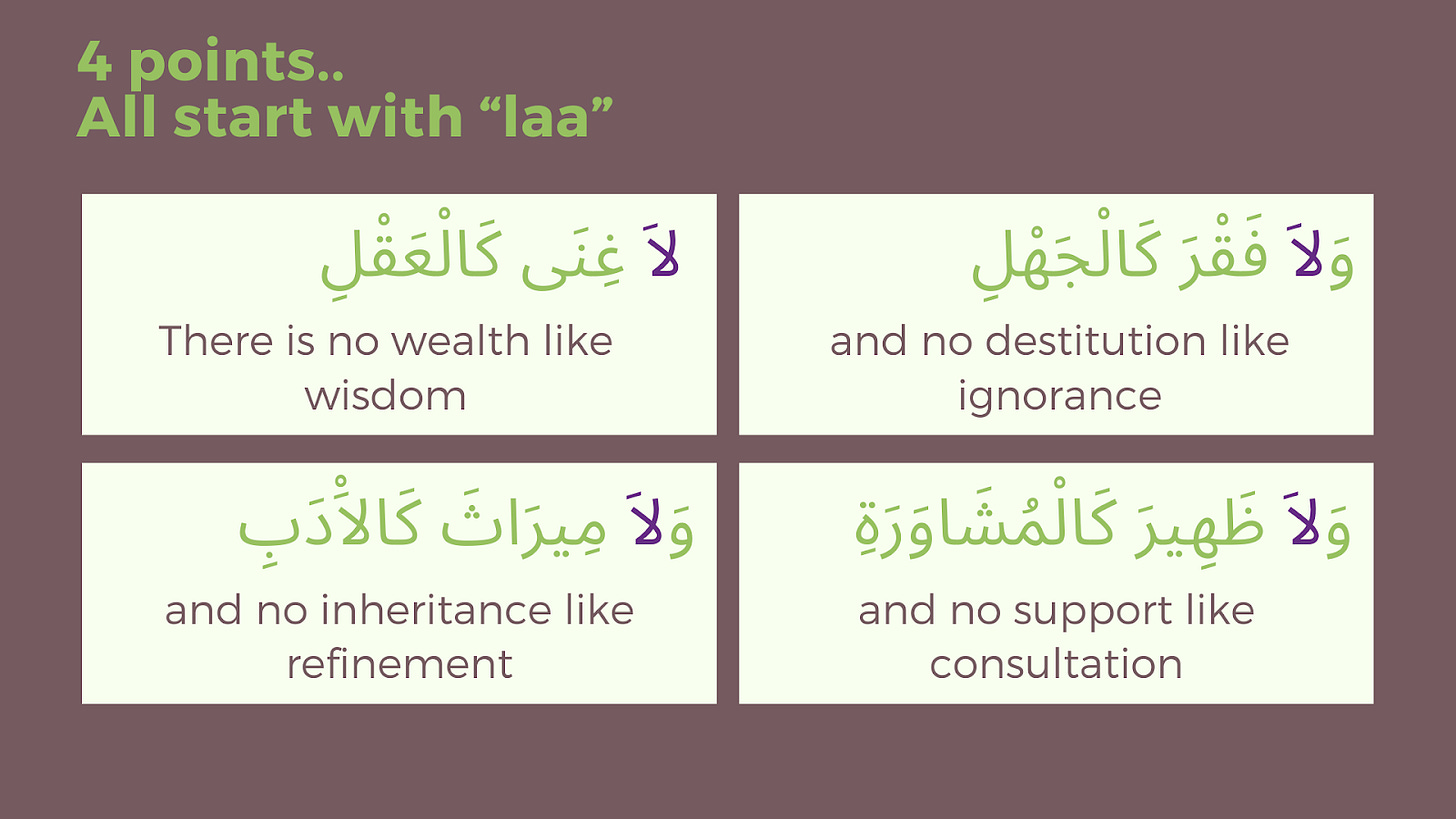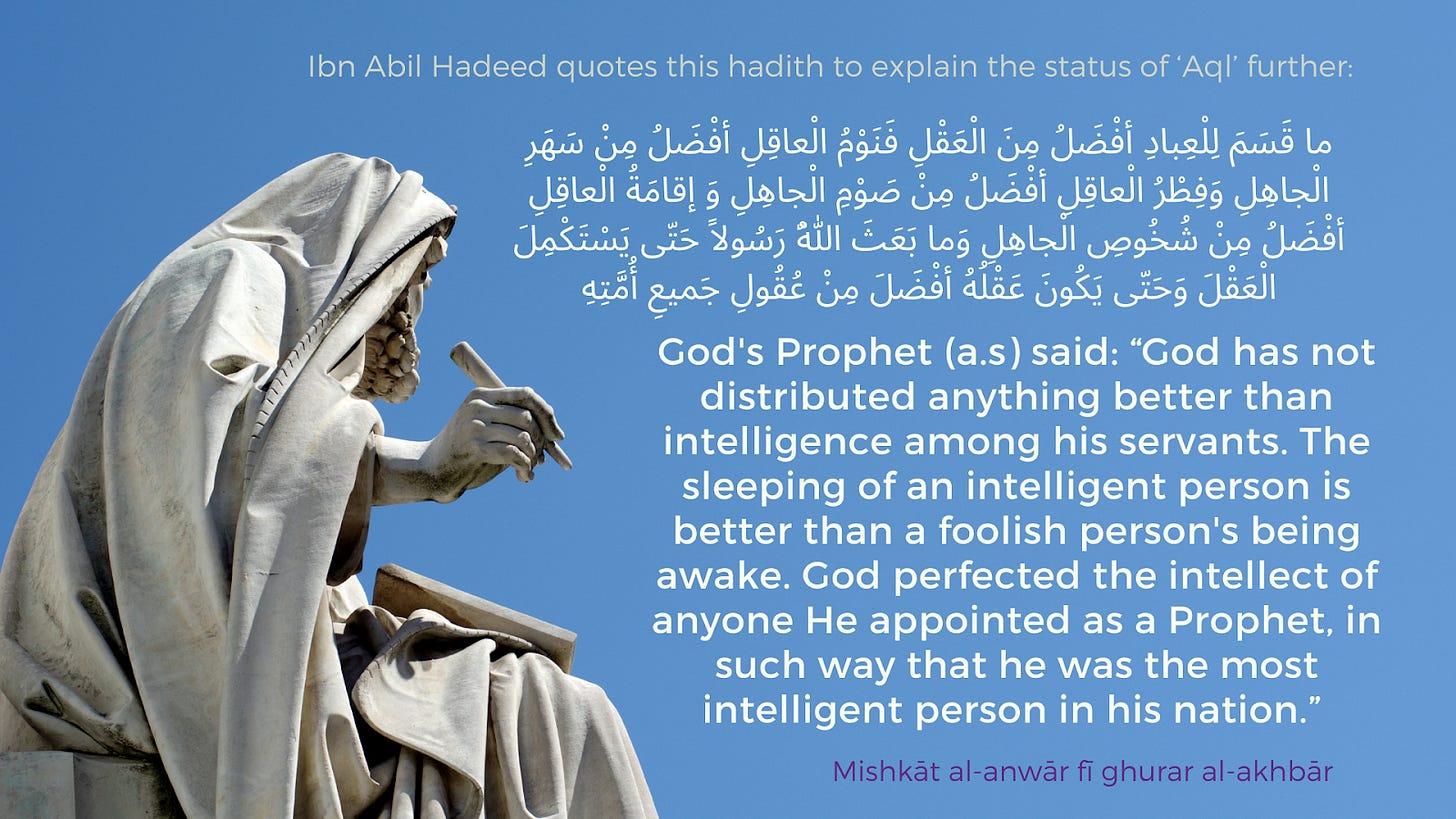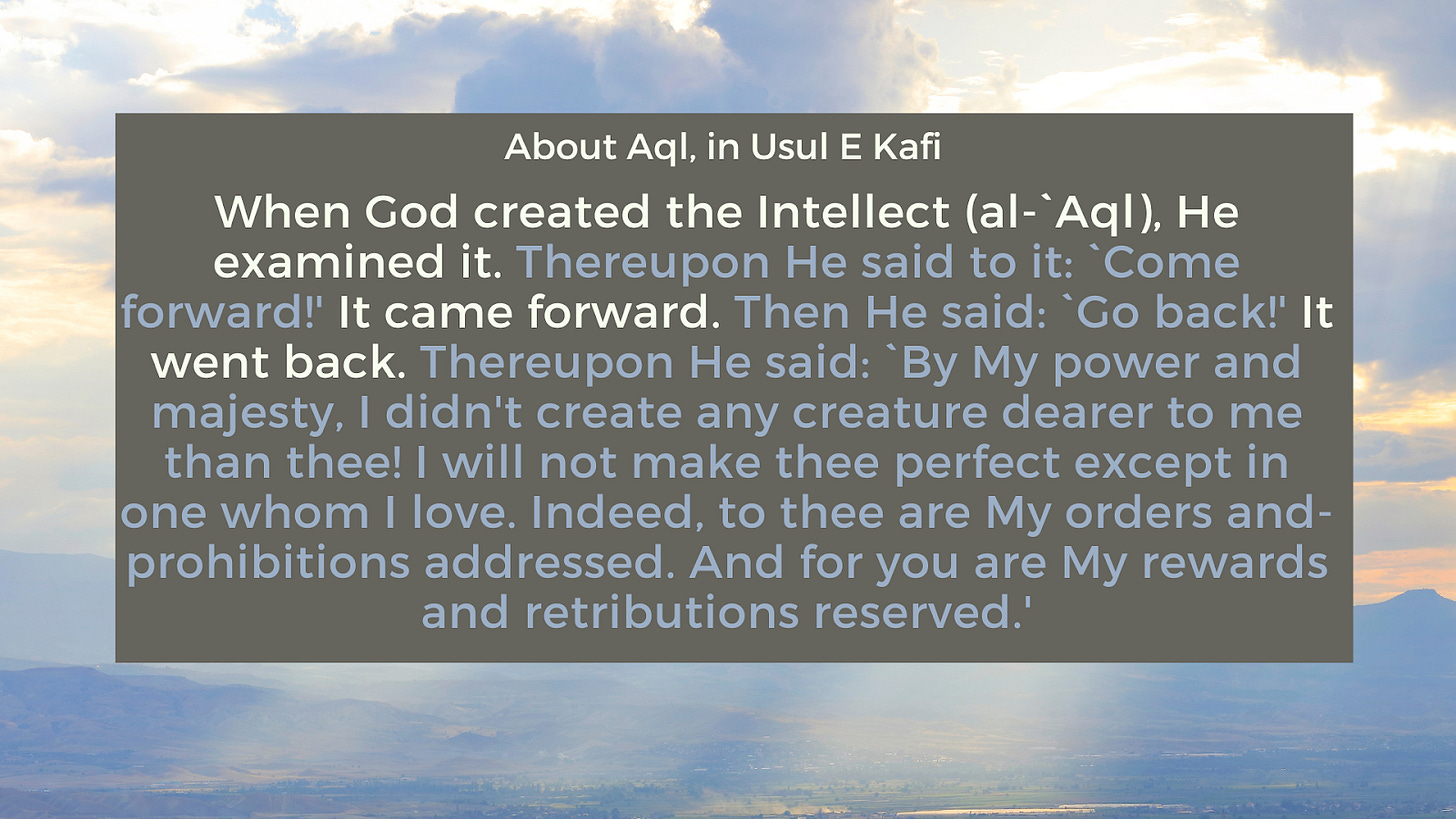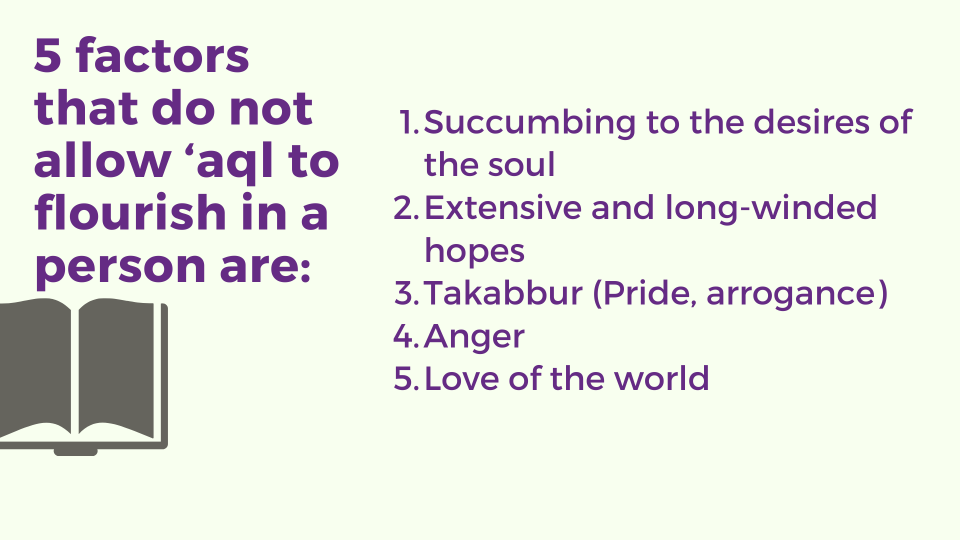Saying 54 - Amīr al-Muʾminīn’s (ʿa) four pieces of advice starting with ‘la’ [1 of 2]
In this saying, Imām ʿAlī (ʿa) presents four fundamental points for a successful life. Interestingly, the four points start with “ لاَ”
﷽
In the Name of Allah, the All-Beneficent, the All-Merciful
وقال عليه السلام : لاَ غِنَى كَالْعَقْلِ، وَلاَ فَقْرَ كَالْجَهْلِ، وَلاَ مِيرَاثَ كَالاْدَبِ، وَلاَ ظَهِيرَ كَالْمُشَاوَرَةِ
Amīr al-Muʾminīn, peace be upon him, said: There is no wealth like wisdom, no destitution like ignorance, no inheritance like refinement and no support like consultation.
In this profound saying of the Imām (ʿa), four points are mentioned, each starting with the word “laa”. Let us examine each of the points in depth.
The First ‘La”:
Firstly, our Imām (ʿa) mentions “There is no wealth like wisdom(‘aql)”
Some exegetes of Nahj al-Balāghah have mentioned that ‘aql’ and other words that are related to this root, appear over 50 times in the Qurʾān! (which shows how important ‘aql is in Islam and Qurʾān).
Traditions about ‘aql in our books of Ḥadīth are so many in number. In fact, Shaykh Kulaynī in his first volume of Ūṣūl al-Kāfī, in the chapter of “Al Aql Wal Jahl” quotes several ḥadīth from Rasūlullāh (ṣ) and the Aʾimmah of the Ahl al-Bayt (ʿa) on this topic.
Only a person who uses his ‘aql can understand the wilayat of Amīr al-Muʾminīn (ʿa). Does it make any sense for Rasūlullāh (ṣ) to spend 23 years presenting and propagating Islam, only to leave it with no one to care over it?
Let us ponder over this ayah:
قُلِ اللَّهُ يَهْدِي لِلْحَقِّ ۗ أَفَمَن يَهْدِي إِلَى الْحَقِّ أَحَقُّ أَن يُتَّبَعَ أَمَّن لَّا يَهِدِّي إِلَّا أَن يُهْدَىٰ ۖ فَمَا لَكُمْ كَيْفَ تَحْكُمُونَ
Say, ‘Allah guides to the truth. Is He who guides to the truth worthier to be followed, or he who is not guided unless shown the way? What is the matter with you? How do you judge?’ (Sūrah Yūnus, Verse 35)
The only individual who can be our guide is the one chosen by Allah, who is already knowledgeable and doesn't require guidance himself.
By examining the writings of our Muslim counterparts, we observe that anyone who utilizes reason and intellect acknowledges the truth. (Agha Mehdi Puya has cited more than 15 quotes from the books of our Muslim brethren, highlighting the virtues of Imām ʿAlī (ʿa)).
Having considered all of these references, if the concept of wilayat (leadership) is still not accepted, it could be an indication that we are not utilizing the intellectual capacity (aql) bestowed upon us by Allah.
ًWho are the people who have ‘aql?
The Qurʾān also refers to them as ‘ULUL ALBAAB’ (possessors of intellect). Sūrah ar-Raʿd, verse 19-22 talks about these people, and gives 6 qualities that they possess.
أَفَمَن يَعلَمُ أَنَّما أُنزِلَ إِلَيكَ مِن رَبِّكَ الحَقُّ كَمَن هُوَ أَعمىٰ ۚ إِنَّما يَتَذَكَّرُ أُولُو الأَلبابِ
الَّذينَ يوفونَ بِعَهدِ اللَّهِ وَلا يَنقُضونَ الميثاقَ
وَالَّذينَ يَصِلونَ ما أَمَرَ اللَّهُ بِهِ أَن يوصَلَ وَيَخشَونَ رَبَّهُم وَيَخافونَ سوءَ الحِسابِ
وَالَّذينَ صَبَرُوا ابتِغاءَ وَجهِ رَبِّهِم وَأَقامُوا الصَّلاةَ وَأَنفَقوا مِمّا رَزَقناهُم سِرًّا وَعَلانِيَةً وَيَدرَءونَ بِالحَسَنَةِ السَّيِّئَةَ أُولٰئِكَ لَهُم عُقبَى الدّارِ
Is someone who knows that what has been sent down to you from your Lord is the truth, like someone who is blind? Only those who possess intellect take admonition (19)
—those who fulfill Allah’s covenant and do not break the pledge solemnly made, (20)
and those who join what Allah has commanded to be joined, and fear their Lord, and are afraid of an adverse reckoning (21)
—those who are patient for the sake of their Lord’s pleasure, maintain the prayer, and spend secretly and openly out of what We have provided them, and repel evil [conduct] with good. For such will be the reward of the [ultimate] abode:(22)
Nonetheless, the intellect being discussed here is the one that establishes a connection with Allah, guides individuals towards obedience to Him, and keeps them away from wrongdoing. We come across individuals who possess extensive education, but this does not align with the concept of "aql" in Islam. In fact, some of that knowledge may even have Satanic influences, and numerous instances exist where knowledge has been misused. To put it simply, the teachings of Imām Jaʿfar aṣ-Ṣādiq (ʿa) provide the most comprehensive understanding of this matter.
الكافي عن بَعضِ أصحابِنا رَفَعَهُ إلَى الإمامِ الصّادقِ (عَلَيهِ الّسَلامُ): قلتُ لهُ: مَا العقلُ؟ قالَ: ما عُبِدَ بِهِ الرَّحمنُ وَاكتُسِبَ بِهِ الجِنانُ . قالَ: قُلتُ: فَالّذي كانَ في مُعاوِيَةَ ؟ فقالَ: تِلكَ النَّكراءُ ، تِلكَ الشَّيطَنَةُ ، وهِيَ شَبيهَةٌ بِالعَقلِ ولَيسَت بِالعَقلِ .
Imām Jaʿfar aṣ-Ṣādiq (ʿa) was asked what the intellect was, to which he replied, ‘It is that with which The Beneficent God is worshiped and with which Paradise is attained. So the man asked, ‘So what about that which even Muawiya possessed?' He replied, ‘That is a vicious thing, that is devilry, and resembles intellect, though it is not intellect.
Ways to Increase ʿAql
لإمامُ عليٌّ (عَلَيهِ الّسَلامُ): العَقلُ غَريزةٌ تَزيدُ بالعِلْمِ والتَّجارِبِ .
Imām ʿAlī (ʿa) said, ‘Reason is an instinct that is enhanced by knowledge and experience.
Leaving things that have no importance
الإمامُ عليٌّ (عَلَيهِ الّسَلامُ) : أفْضَلُ العَقْلِ مُجانَبَةُ اللَّهْوِ
Imām ʿAlī (ʿa) said, The best intelligence is keeping away from idle sport.
الإمامُ عليٌّ (عَلَيهِ الّسَلامُ): بِتَركِ ما لا يَعنيكَ يَتِمُّ لَكَ العَقلُ
Imām ʿAlī (ʿa) said, ‘By abandoning that which does not concern you, your intellect will be completed.
Controlling one’s tongue
الإمامُ عليٌ (عَلَيهِ الّسَلامُ): يُستَدَلُّ عَلى عَقلِ كُلِّ امرِئٍ بِما يَجري عَلى لِسانِهِ .
Imām ʿAlī (ʿa) said, ‘The intellect of every man can be determined by the words that flow on his tongue.
Following the truth
لا يَكمُلُ العَقلُ إلّا بِاتِّباعِ الحَقِّ
‘The intellect is only perfected through following the truth’
What are the factors that do not allow ʿaql to flourish?
Succumbing to the never-ending desires of the soul.
الإمامُ عليٌّ (عَلَيهِ الّسَلامُ) : اِحْذَرُوا هَوىً هَوى بِالأَنْفُسِ هُوِيّاً وَ أبْعَدَها عَنْهُ قَرارَةَ الفَوْزِ قَصِيّاً
Imām ʿAlī (ʿa) said, Be cautious of the vain desire that pulls the souls down, dropping them [to the lowest levels], and causes them to become more distanced from [the place of] success [and prosperity].
الإمامُ عليٌّ (عَلَيهِ الّسَلامُ) : مَنِ اتَّبَعَ هَواهُ أرْدى نَفْسَهُ
Imām ʿAlī (ʿa) said, Whoever follows his vain desire destroys himself.
الإمامُ عليٌّ (عَلَيهِ الّسَلامُ) : فازَ مَنْ غَلَبَ هَواهُ وَ مَلَكَ دَواعِيَ نَفْسِهِ
Imām ʿAlī (ʿa) said, He who overcomes his vain desire and controls the urges of his [carnal] soul is successful.
Extensive and long-winded hopes
Imam Ali (‘a) said:
الآماَلُ لاَ تَنْتَهِي
Hopes never come to an end
Allah, the Wise, has said:
ذَرْهُمْ ياَكُلُوْا وَ يَتَمَتَّعُوْا وَ يُلْهِهُمُ الْاَمَلُ
Leave them that they may eat and enjoy themselves and (that) hope may beguile them, for they will soon know. Sūrah al-Ḥijr, verse 3
An example of high expectations that blocked ‘aql
Muawiya was jealous of Imām Ḥasan (ʿa), and he resolved to use the Imām’s wife Jo’dah, the daughter of Asha’th Ibn Qais, to poison him.
Muawiyah lured her by promising her that if she poisoned Ḥasan Ibn ʿAlī, he would give her a hundred thousand dirhams and, in addition, he would marry her to his son Yazid. In the hope of acquiring wealth and with the aspiration of becoming the wife of Yazid, she agreed to comply with his request. Muawiyah handed her the poison that he had acquired from the Roman Emperor.
Jo’dah, she carried her hopes and desires to her grave for Muawiyah reasoned that if she could not be faithful to Ḥasan Ibn ʿAlī (‘a), how could she be expected to be faithful to Yazid; and so he refused to fulfill any of his promises. As such, she died in a state of disgrace and humiliation
Takabbur and Pride
الإمامُ الباقرُ (عَلَيهِ الّسَلامُ): ما دَخَلَ قَلبَ امرِئٍ شَيءٌ مِنَ الكِبرِ إلّا نَقَصَ مِن عَقلِهِ
Imām Muḥammad al-Bāqir (ʿa) said, ‘No sooner does an iota of pride enter a man's heart than he incurs a loss in his intellect.
An example from History:
One night Abu Jahl, the most obstinate enemy of the Holy Prophet (ṣ), was circumambulating the Ka’bah in the company of Walid Ibn Mughirah, and while engaged in the act, began to speak about him (peace be upon him and his holy progeny).
Abu Jahl said: By God! He speaks the truth.
Walid rebuked: Keep quiet! How do you say such a thing?
Abu Jahl replied: We knew him, from his childhood, to be a truthful and trustworthy person. How could he, after having grown up and his intellect having matured, become a liar and a traitor?
Walid said: If this is the case, then why don’t you testify to his truthfulness and accept Islam? Abu Jahl said: Do you desire the womenfolk of the Quraish to say that I, Abu Jahl, have submitted myself out of fear of defeat. By the idols Lat and Uzza, I shall never follow him.
Due to this pride and haughtiness, God revealed the following verse:
أَفَرَأَيْتَ مَنِ اتَّخَذَ إِلَٰهَهُ هَوَاهُ وَأَضَلَّهُ اللَّهُ عَلَىٰ عِلْمٍ وَخَتَمَ عَلَىٰ سَمْعِهِ وَقَلْبِهِ وَجَعَلَ عَلَىٰ بَصَرِهِ غِشَاوَةً فَمَنْ يَهْدِيهِ مِنْ بَعْدِ اللَّهِ ۚ أَفَلَا تَذَكَّرُونَ
“Have you then considered him who takes his low desire for his god, and Allah has made him err having knowledge and has set a seal upon his ear and his heart and put a covering upon his eye.”
Sūrah al-Jāthiyah, verse 23
Anger
الإمامُ الصّادقُ (عَلَيهِ الّسَلامُ): الغَضَبُ مَمحَقَةٌ لِقَلبِ الحَكيمِ.
Imam al-Sadiq (AS) said, ‘Anger is such that it destroys the heart of even the wise man.”
A man seeks advice from Rasulullah (s):
Once, a person approached the Holy Prophet (ṣ) and said: Impart me knowledge and teach me the rulings of religion. He (ṣ) said: Go and refrain from getting enraged.
The man said: This very sentence shall suffice for me, and then proceeded to return to his tribe.
When he reached his tribe he observed that a dispute had arisen amongst them and having armed themselves, they stood facing each other ready for battle. Observing this, the man too put on his battle-dress ready to join his friends for battle when suddenly he recollected the words of the Holy Prophet (ṣ) asking him to abstain from anger.
Dropping his weapons, he proceeded towards the opposition and began to reason with them: Battle and war shall not yield anything. I shall pay you from my own wealth whatever you desire!
Realizing the truth of his words, they acquiesced: We are more deserving of disregarding and ignoring the differences that have taken place.
And thus, by this advice of the Holy Prophet (ṣ), a major conflict was averted.
Anger that manifests itself while battling the infidels or opposing someone who seeks to inflict harm upon one’s reputation, family, etc., is not only regarded as commendable by religion and intellect, but is also a sign of courage and valor.
But in instances other than the above, anger is from the whisperings of Shaitan and a key to all evils. It destroys intellect and forces changes in the physical and mental disposition of man by altering the color of the face and the eyes, and bringing about mental aggravation and stress; it is also accompanied by other effects such as abuses, taunts, violence, ridicule, murder and other similar acts.
It is better to stay away from all such things that induce anger, and repel it by practicing patience and forbearance
Love of the world
Allah, the Wise, has said:
وَ ماَ الْحَياَةُ الدُّنْياَ إِلاَّ لَعِبٌ وَّ لَهْوٌ
“And this world’s life is naught but a play and an idle sport.”(Sūrah al-Anʿām, verse 32)
The Noble Prophet (ṣ) stated:
مَنْ أَصبَحَ وَ الدُّنْياَ أَکْبَرُ هَمِّهِ فَلَيْسَ مِنَ اللٌّهِ فِي شَيْءٍ
“He who rises in the morning such that his greatest concern is for (the issues of) the world, shall have nothing of (the guardianship) of Allah.” Jame’ al-Sa’adat, Volume 2, Page 24.
There are many examples from history that demonstrate the effect of the love of this world on people’s aql. Examples include Umar e Saad, and Talha and Zubayr. About Umar e Saad we read in ziyarat Arbaeen:
In our contemplation this week, we have focused on the initial aspect of Saying Number 54. InshāʾAllāh, in the following week, we will delve into the remaining three facets of this profound saying. As we conclude, let us beseech Allah to bless us with heightened intellect (ʿaql) and liberate us from the constraints of ignorance.





